Ruby Job Fair 2012: This Friday, February 10th
The Ruby Job Fair isn’t your father’s (or mother’s) job fair. And why would it be? After all, it’s an event put on by Meghann and the other fine folks at Unspace, the development shop that gave the world the mind-blowingly amazing RubyFringe and FutureRuby conferences.
You may have heard or learned from painful experience that job fairs are like this:

Unspace’s gatherings are a little more like this:
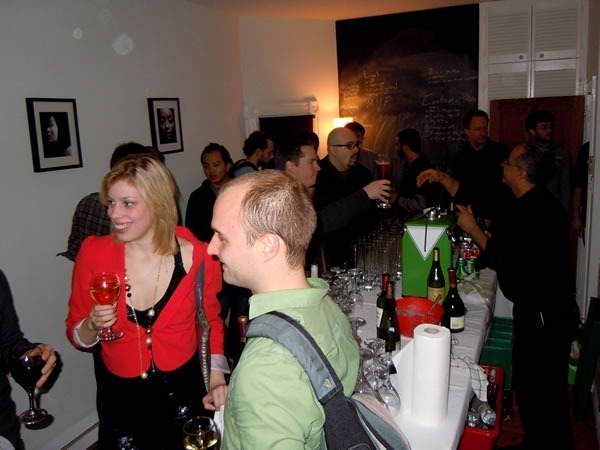
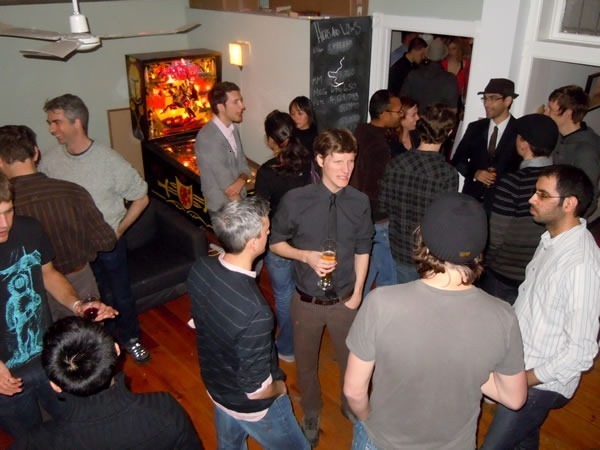
The two photos above were taken at an event that they threw called Technologic, which took the typical evening tech seminar on its ear. You can read more about it in my blog entry about that event.
If you’re looking for work that involves Ruby programming and you’re going to be in downtown Toronto on Friday, you should register to attend the Ruby Job Fair. It’ll be your chance to meet prospective Ruby employers and their representatives, which will include me – I’ll be there as the Shopify Guy. You won’t be able to miss me: I’ll be the one with the accordion…

The quick details about Ruby Job Fair:
- Date: Friday, February 10, 2012
- Time: 6:00 p.m. – 9:00 p.m.. Do not show up early. They’ve got work to do.
- Place: Unspace HQ, 342 Queen Street West, just a bit east of Spadina, beside the Lululemon store.
- Registration fee: $5 for job-seekers, $15 for employers seeking job-seekers. You need to register to attend.
- Other details: See the registration site and read the notes carefully!
Why Work at Shopify: The Hard-Nosed, Pragmatic Business Reasons

Normally, I’d start with a description of Shopify’s hacker ethic, how it’s a great-yet-casual work environment, that everyone gets a MacBook Pro or MacBook Air as their work machine, that and how fun and rewarding it is to work there. That’s all true, but I’m sure every software development shop has a spiel along the same lines. So I’ll give you that spiel later. How ‘bout I answer the question that might be lingering somewhere in your mind: “Are you guys still going to be around a year from now, or are you going to crash and burn and leave me looking for work again?”
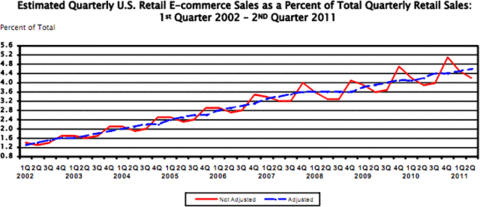
For starters, we’re in the ecommerce business, and business is good. How good? In the second quarter of 2011 – remember, that’s only April, May and June – ecommerce sales in the U.S. were $48 billion. And impressive as that figure may be, ecommerce is still less than 5% of all retail.
Ecommerce is growing too, and it’s becoming a bigger and bigger part of how people buy and sell things; in fact, ecommerce sales are growing at over twice the rate of all retail.
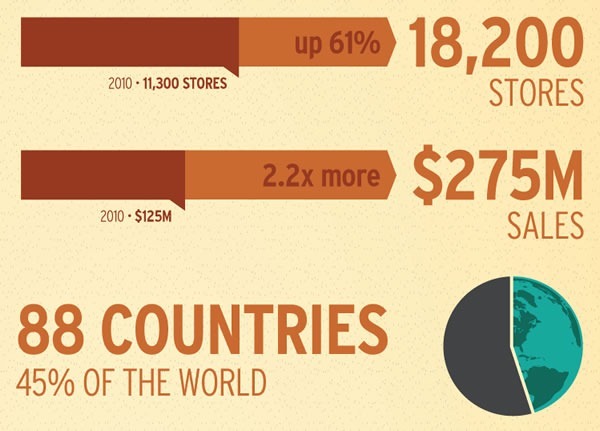
Going from ecommerce in general to Shopify in particular, things are looking great there too. We went from 11,000 to 18,000 shops in 2011, and as of this writing, we’ve crossed the 20,000 mark. The 2010 total sales from all our shops was $125 million, and we more than doubled that last year, moving $275 million in products.
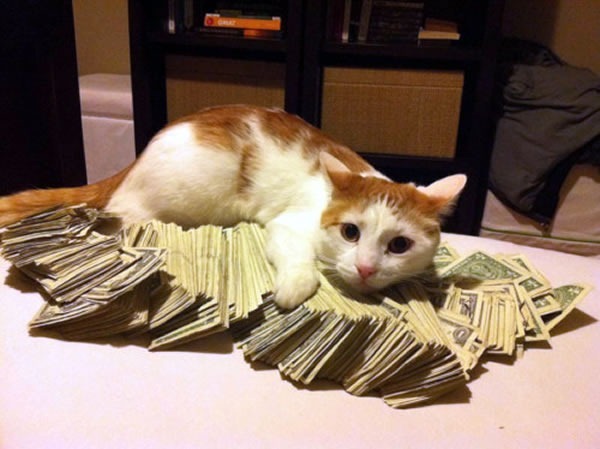
On top of being a profitable business, we also have had two rounds of funding, which gave us a grand total of $22 million invested in us. That money’s being used to grow the company in all sorts of ways, from the Shopify Fund to things like our recent acquisition of Select Start Studios, a mobile dev company.
Why Work at Shopify: The “I Want to Work Someplace Cool” Reasons
Here’s what was waiting for me at my desk on my first day at Shopify. I felt like a kid in a candy store:
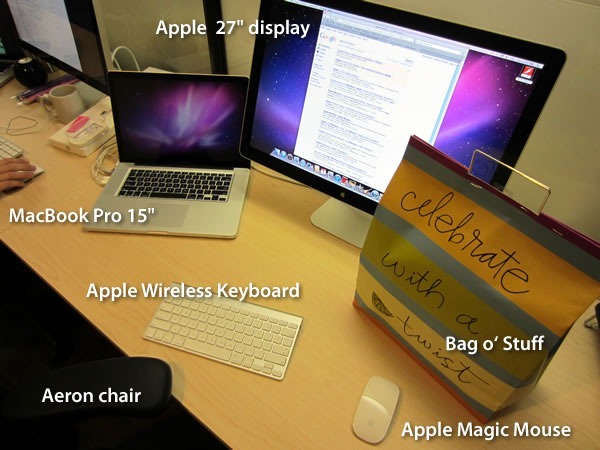
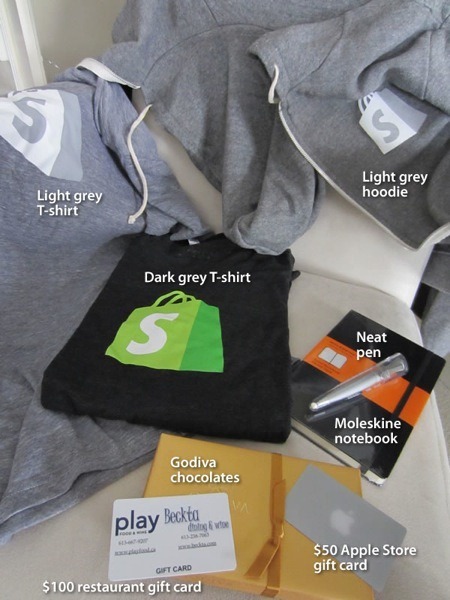
We want to do good work, and good work needs good tools.
Good work needs a good physical environment, and we’ve got that in spades. Check out our brand-new office. Here’s the reception desk, which is occupied by Laura, our gets-stuff-done-so-we-can-get-stuff-done person:
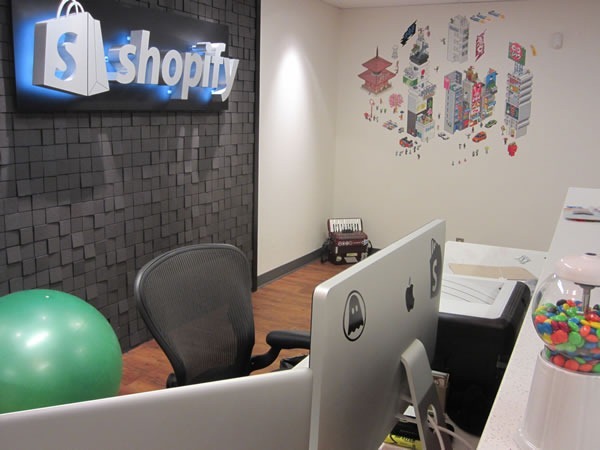
We believe that small, agile teams work best, so we’ve broken our space into offices just like the one below, and each team is free to set up and decorate their space as they see fit. They’re not normally this crowded; the photo below is from the party we had on Friday:
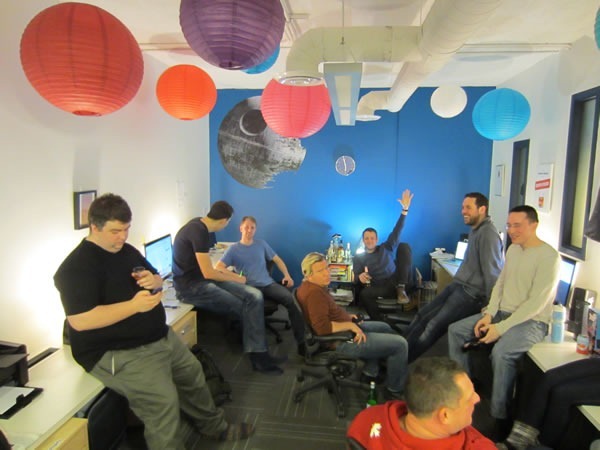
I’m in the developer advocate/evangelism group, and we went with this pop art wall covering in our zone:
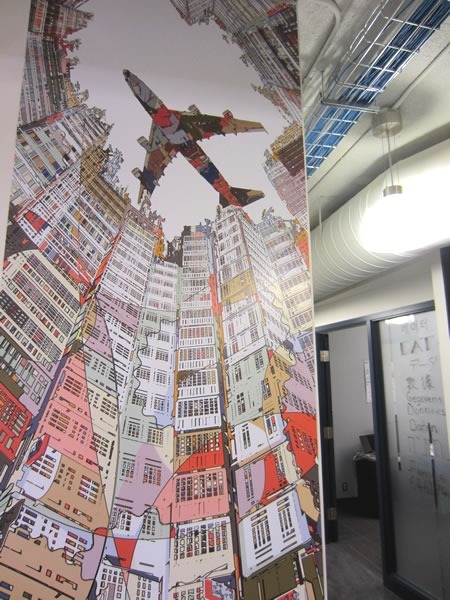
Others on our team have some great illustration talents and put them to good use:
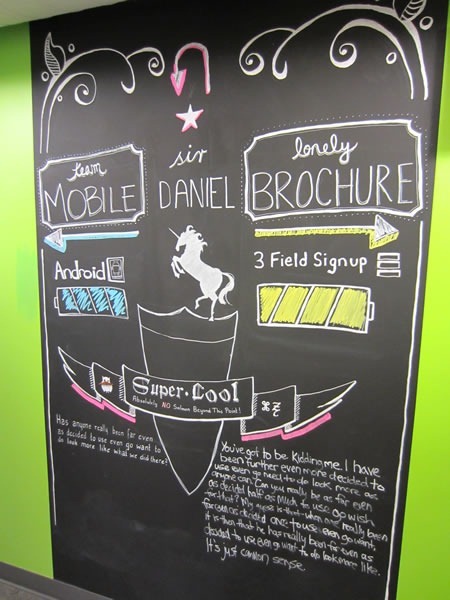
Sure, we’ve got your standard meeting rooms (and they’re pretty nice for what they are):
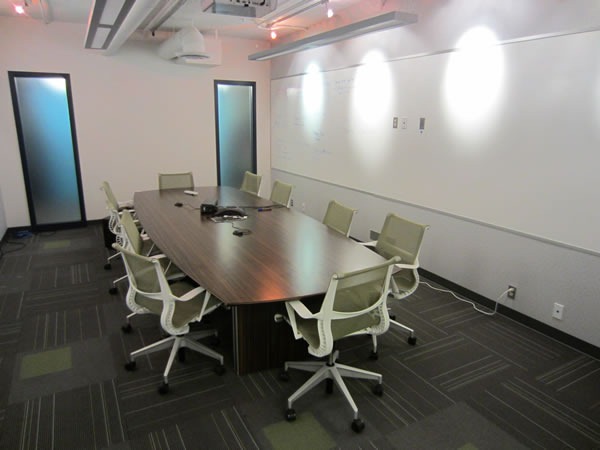
…but one of them’s equipped with an Xbox and Kinect:
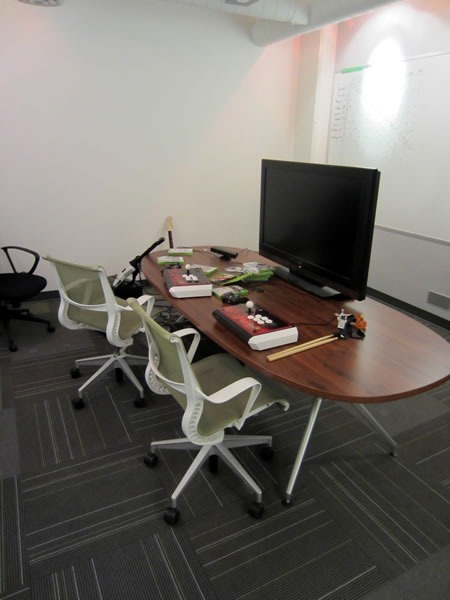
And then there are little gems like this room:
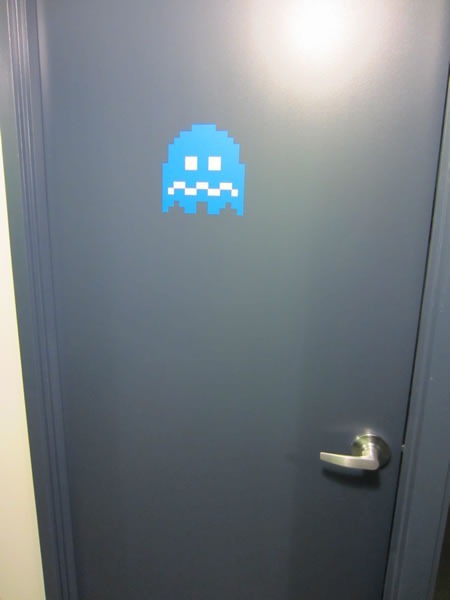
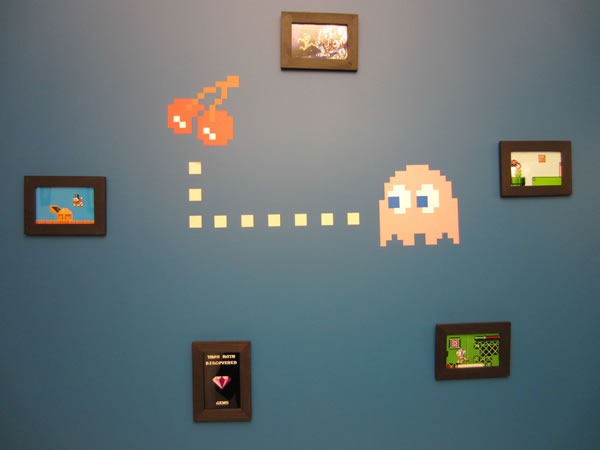
It’s the 8-bit paradise. I spent an afternoon working on API docs in the room, a nice quiet space where you can concentrate, after which you can reward yourself with classic 1980s console action!
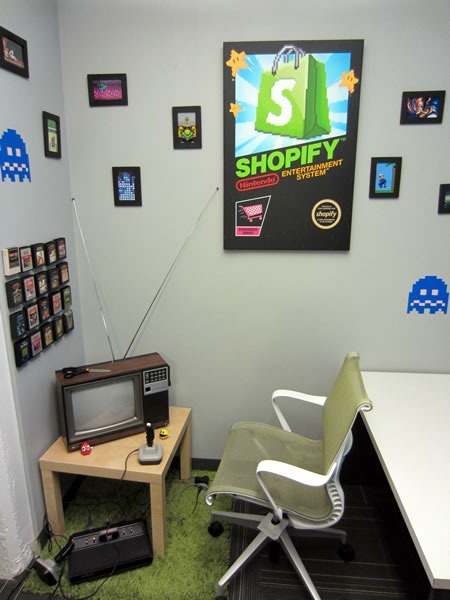
This poster was created by our design team, a very talented bunch:
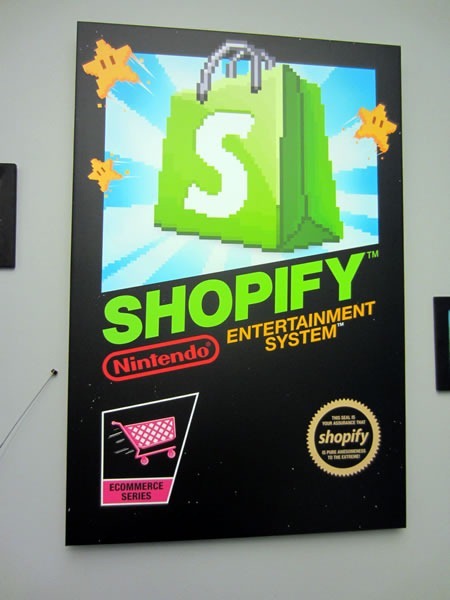
We’ve got a fine collection of vintage cartridges:
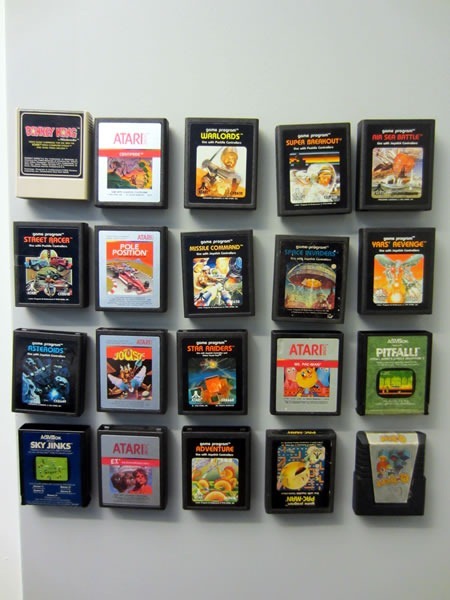
Ah, the Atari 2600. It takes me back to my wonderfully misspent youth:
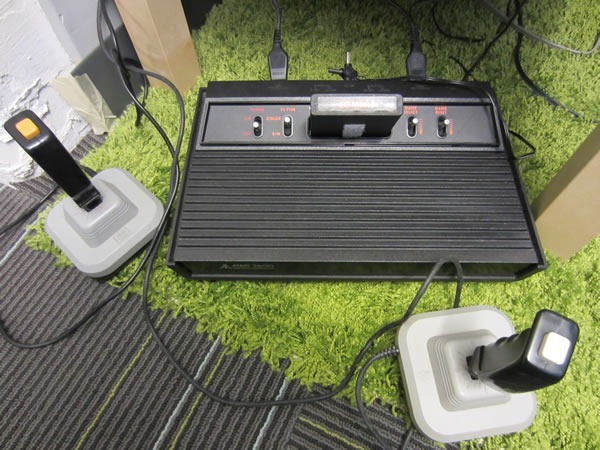
Why Work at Shopify: The “I Want to Draw the Owl” Reasons
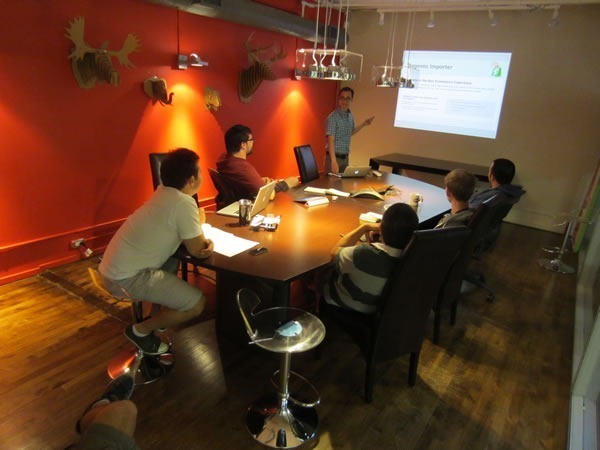
One of the reasons that Shopify is successful is that we’ve worked out some ways of doing things. We’re all about “drawing the owl”, and the way we do things is an in the service of drawing that owl. (Don’t worry, you’ll soon know what “drawing the owl means”.)
Shopifolks – that’s what I like to call people at Shopify – are self-starters. Once given a goal, they use their skills, knowledge and good judgement to do the work necessary to hit that goal. They get stuff done. They’re what Y Combinator’s Paul Graham calls “resourceful”.
I recently wrote about how my team (and pretty much every other team at Shopify) gets things done, but it’s worth repeating:
- Act like an owner. You don’t "just work here", you own a piece of a company and have a stake in its success. Work as if your livelihood, career and reputation were riding on it, because as an owner, it is! Be entrepreneurial and own your domain: if you have an idea and it lines up with the company’s goals, make that idea happen.
- Know what to work on and what things to ship. While owners have the freedom to work on and ship whatever they like, they also work in the real world. 80% of what makes the company go is often achieved by doing the most important work first, which typically makes up 20% of the available tasks. Sometimes these tasks can be tedious and feel like drudgery, but if they’re what makes things happen for our customers and their customers, they’ve got to be done, and with the highest priority.
- Done is better than perfect, or "the best" is the enemy of "the good".Perfectionism is a form of procrastination. It assumes that time is an infinite resource, that other tasks can wait while you add "just one more touch" and that "perfect" is attainable. You have to be able to make the call and say "done" at some point. A good feature that our customers use and enjoy is infinitely better than a perfect one that "will be available soon". As they say at Apple, "Real artists ship".
- Have high standards. While done is better than perfect, good still remains better than bad.
- It’s okay to fail; just fail gracefully. The only sure-fire way to not fail is to not do anything. Since we can’t do that and remain in business, never mind take the company to the heights we want to, we have to accept failure as part and parcel of trying. Sometimes we’ll make mistakes, other times we’ll do things right and still our best-laid plans won’t work because of circumstances outside our control. The trick is to learn from failure and make sure our failures aren’t fatal. As our CEO Tobi likes to say: "If I’m not failing every now and again, I’m not trying hard enough."
- Communicate good news quickly, communicate bad news ever more so. The first part is easy: it takes no effort to tell the team your project is a success. It’s a good thing to do so; good news bolsters the team and success often breeds more success. However, a combination of pride and fear (and in some companies, a "cover your ass" culture) makes it difficult to tell the team that you’re having trouble or that something’s not working out. It’s best to tackle problems as soon as possible, while they’re still small and manageable, and the best way to do this is to communicate bad news as quickly as possible — remember, it’s okay to fail.
- Understand and respect the makers’ and managers’ schedules. As Paul Graham wrote in his essay, Maker’s Schedule, Manager’s Schedule, makers and managers operate by different schedules. Managers’ days are determined by their appointment calendars, which divide the days into hours and even half-hours, and things like meetings fit into the manager’s schedule easily. Makers, on the other hand, do things in half-day or even full-days blocks, and things like meetings are disruptive. Some of the team operate on a maker’s schedule, other operate on a manager’s schedule, and many of us switch between the two, depending on what day it is and what tasks they have on that day. Know who operates on which schedule (and when), and understand and respect those schedules.
- Operate lean and mean. We’re made up of multi-talented, capable, autonomous, ambitious go-getters, and that means we don’t have to operate like a big, lumbering beast. Unless the circumstances are unusual, there really should be 2 people maximum per deal or project. Meetings and calls should be kept to 30 minutes or less, not counting brainstorming or design pow-wows. And full-on meetings aren’t always necessary: you should be able to "just pop by" anyone’s office or desk or call them up on Skype.
- Update often. Because we operate lean, means and independently, communication is vital. Keep your teammates apprised of your progress!
- Draw the owl. In the end, that’s what you’re trying to do…
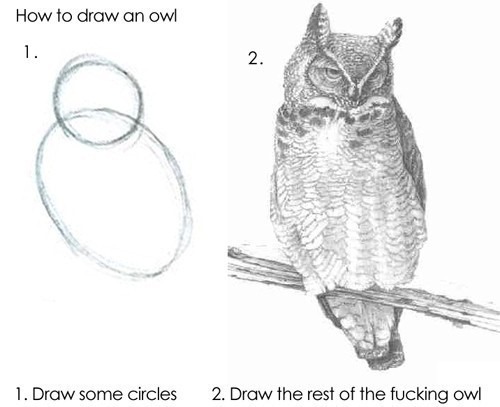
Think You Can Work at Shopify? See Me at Ruby Job Fair.
If Shopify looks like the sort of place where you’d like to work, and if you think you’ve got the skills, enthusiasm and passion to work with us, come see at Ruby Job Fair. I’d be happy to answer all your questions and hook you up!
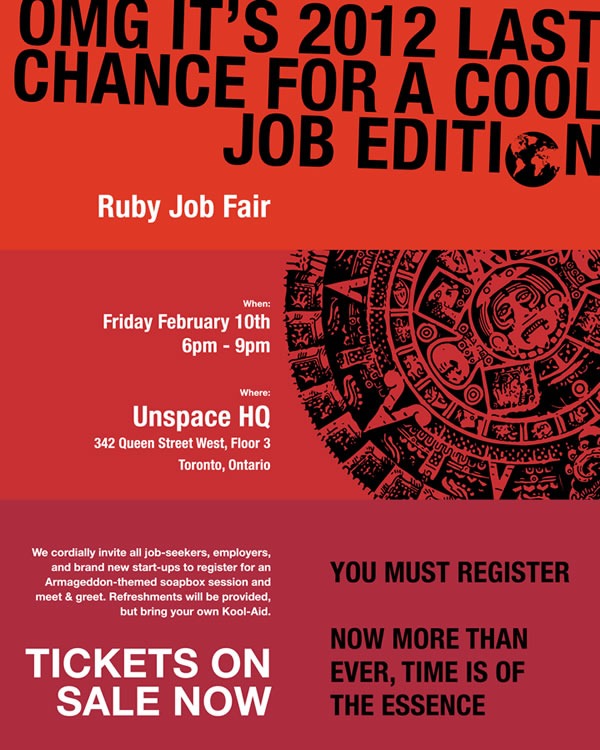
7 replies on “Looking For a Job at Shopify? Come to Ruby Job Fair 2012 and Talk to Me!”
[…] I’ll be there in my capacity as Shopify’s Platform Evangelist, flying the Shopify flag. There are many reasons that you might enjoy working for Shopify, and I explain them in my article in… […]
[…] Via: Global Nerdy […]
[…] If you’re looking to find out more about Ruby Job Fair, check out the Ruby Job Fair site as well as my earlier article on the Fair. […]
[…] If you’re looking to find out more about Ruby Job Fair, check out the Ruby Job Fair site as well as my earlier article on the Fair. […]
[…] making the Fast Company list doesn’t impress you, maybe my earlier article about why Shopify’s a great place to work will. From the company’s success to interesting projects to the way we get stuff done to the cool […]
[…] making the Fast Company list doesn’t impress you, maybe my earlier article about why Shopify’s a great place to work will. From the company’s success to interesting projects to the way we get stuff done to the cool […]
Something tells me there is a lot of work and passion that has to go into drawing that fucking owl than a few circles and ‘presto’ owl.